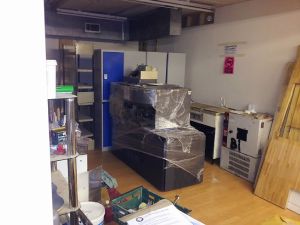Flow Cytometer: Difference between revisions
mNo edit summary |
mNo edit summary |
||
| Line 18: | Line 18: | ||
}} | }} | ||
Status: Currently waiting for | '''Status:''' Currently waiting for basement plumbing to complete, before proceeding with fixing the fluid-assembly at the front right of the instrument. It needs a dust cover, or some protection to access the laser cabinet. | ||
Imperial College donated a Flow Cytometer. The unit is currently sitting on 1.8m X 0.8m = 1.44 square meters of floor space in the PCB area of the basement. There are a number of large external units some of which are for providing power and cooling to the large laser. (I do not anticipate that the largest laser will be tested for some time) | Imperial College donated a Flow Cytometer. The unit is currently sitting on 1.8m X 0.8m = 1.44 square meters of floor space in the PCB area of the basement. There are a number of large external units some of which are for providing power and cooling to the large laser. (I do not anticipate that the largest laser will be tested for some time) | ||
Revision as of 14:48, 1 October 2013
Status: Currently waiting for basement plumbing to complete, before proceeding with fixing the fluid-assembly at the front right of the instrument. It needs a dust cover, or some protection to access the laser cabinet.
Imperial College donated a Flow Cytometer. The unit is currently sitting on 1.8m X 0.8m = 1.44 square meters of floor space in the PCB area of the basement. There are a number of large external units some of which are for providing power and cooling to the large laser. (I do not anticipate that the largest laser will be tested for some time)
There is a good description of how a flow cytometer works here; http://probes.invitrogen.com/resources/education/tutorials/4Intro_Flow/player.html
It was donated as working, but in need of repair. There is quite a lot of damage due to corrosion, and to the sampling area.
The machine requires a dust free environment due to it's use of lasers and optics. Hence we are currently planning further inspection work.
I am currently looking to obtain a copy of the service manual.
